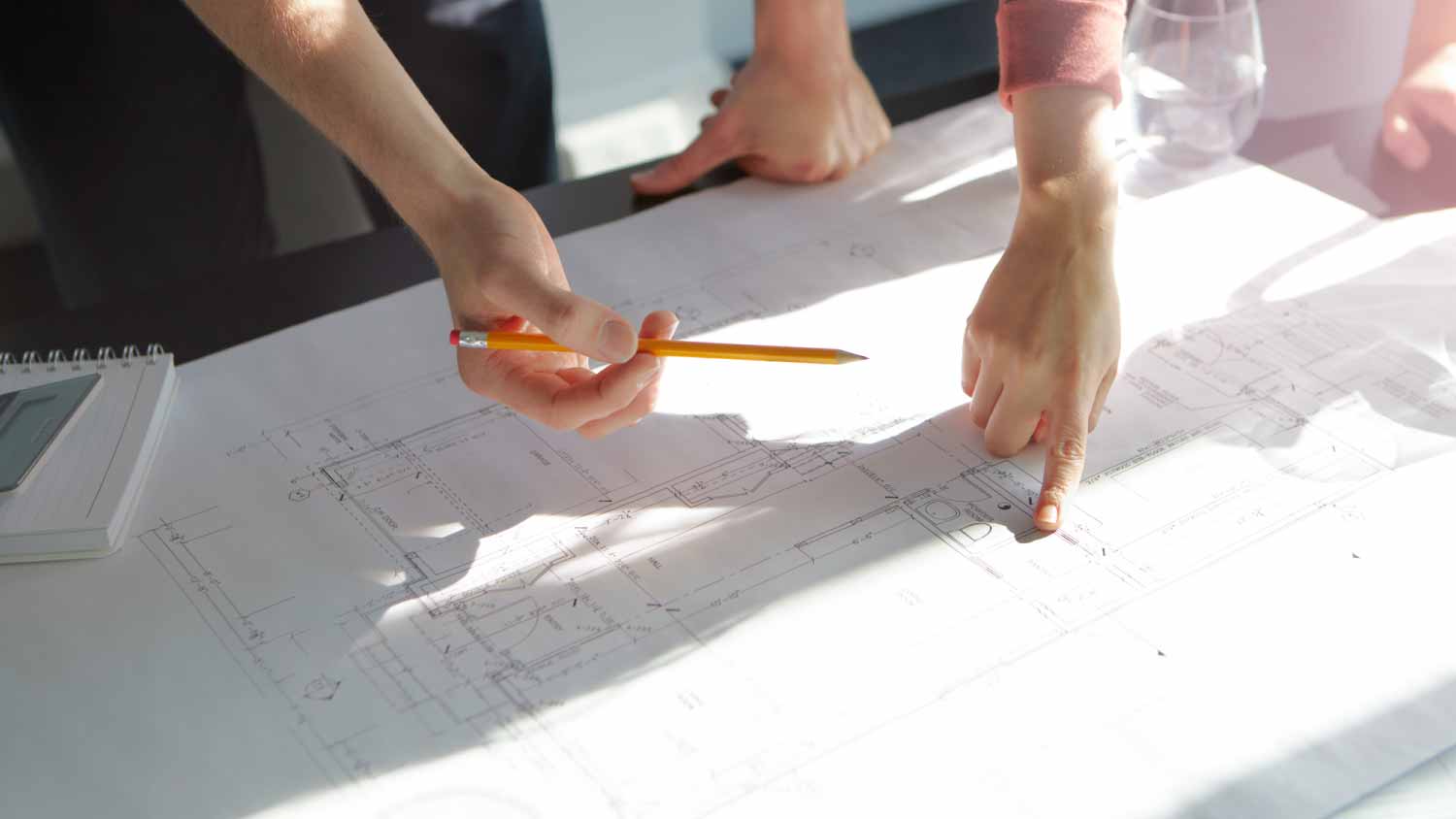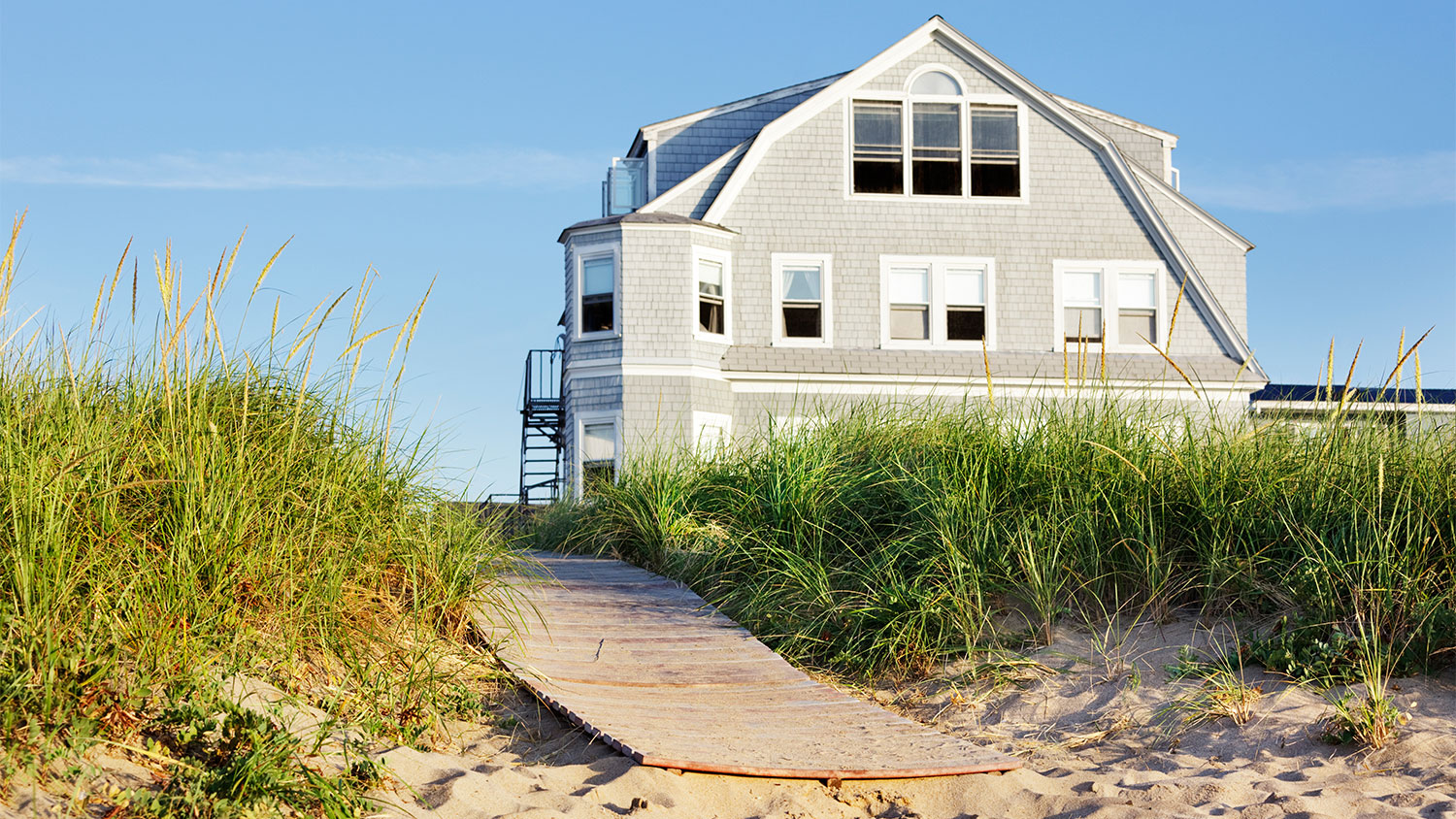
Need to know how much blueprints cost for your new construction project? Use this comprehensive cost guide to get an accurate estimate for your build.
Architectural service costs depend on your project and location. Check with a local pro for your specific job.
Building a ranch home offers single-level living and accessibility.
The cost to build a ranch home varies by home size, materials, and labor rates.
Expect to pay between $100 and $200 per square foot to build a ranch home.
Custom features and site prep can significantly impact your budget.
Hiring experienced pros costs an average of 25% more than building a home yourself, but ensures quality and code compliance.
This article was created using automation technology and thoroughly fact-checked and edited by an Angi Editor in accordance with our AI policy.
The cost to build a ranch home averages $190,000 to $480,000, with most projects totaling $328,000 on average. Homeowners pay $100 to $200 per square foot on average, depending on finishes and location. Understanding these costs helps you plan your budget and make informed decisions for your new home.
Let’s walk through what shapes your project’s price, how professional and DIY routes compare, and what choices help you get the most for your investment.
The total cost to build a ranch home is made up of several key phases, each with its own set of expenses. From preparing your site to the final touches, every stage impacts your overall budget. Material and labor costs are distributed across these phases, with design complexity—like open floor plans or custom layouts—often increasing both time and expense.
The average cost per square foot for a ranch home ranges from $100 to $200. Simpler designs with standard finishes land at the lower end, while more customized or segmented layouts can push costs higher. Labor accounts for 30% to 50% of your total, while materials make up the rest.
| Project Phase | Description | Average Cost |
|---|---|---|
| Site prep | Clearing, grading, and soil testing | $5,000–$15,000 |
| Foundation | Slab, crawl space, or basement installation | $4,000–$25,000 |
| Framing | Structural framing, trusses, sheathing | $20,000–$55,000 |
| Exterior | Roofing, siding, windows, exterior doors | $25,000–$65,000 |
| Interior | Insulation, drywall, flooring, cabinetry | $45,000–175,000 |
| Systems | Electrical, plumbing, HVAC | $30,000–$75,000 |
Home design complexity plays a big role: open plans use fewer interior walls but may require stronger beams, while segmented layouts can increase framing and finish costs.
The size of your ranch home is one of the largest factors in total cost. As square footage increases, material and labor needs grow. Smaller ranch homes cost less overall, but the cost per square foot may be slightly higher due to fixed expenses. Adding bedrooms or bathrooms raises prices by requiring extra plumbing, electrical, and finishes.
Expanding your home’s footprint with extra bedrooms or bathrooms increases both material and labor costs, especially for plumbing and HVAC.
| Home Size (Sq. Ft.) | Description | Average Cost |
|---|---|---|
| 1,200 | Small ranch, 2 bedrooms, 1–2 baths | $120,000–$240,000 |
| 1,800 | Medium ranch, 3 bedrooms, 2 baths | $180,000–$360,000 |
| 2,500 | Large ranch, 4+ bedrooms, 2+ baths | $250,000–$500,000 |
Building a ranch home involves several professionals, each with a specific role and cost. Their expertise ensures your home is safe, up to code, and built to last. Regional labor rates and market demand can shift these costs.
General contractors oversee the project, hiring and coordinating subcontractors for framing, roofing, and finishing. Architects or designers create plans and ensure code compliance, while specialized trades like electricians, plumbers, and HVAC technicians handle essential systems.
The general contractor manages your ranch home build from start to finish. Expect to pay 10% to 20% of the total project cost for their services. This fee covers project management, scheduling, hiring and supervising subcontractors, and quality control. Choosing a reputable contractor is key—they’ll keep your build on track and ensure safety standards.
Look for contractors with proven ranch home experience, strong references, and clear communication. A detailed contract outlining timelines, responsibilities, and payment terms protects both parties.
Hiring an architect or designer is wise if you want a custom ranch home or need to maximize a tricky lot. Fees are 5% to 15% of the construction cost for full-service design, or $100 to $250 per hour for consultations. Services include custom floor plans, permit-ready drawings, and help with code compliance.
Professional design can save money long-term by improving space efficiency and reducing costly mistakes.
Specialized trades are essential for safe, functional homes. Electricians charge $50 to $120 per hour, plumbers $45 to $200 per hour, and HVAC technicians $50 to $70 per hour—though larger projects are often priced per job. These pros handle wiring, plumbing installation, and heating or cooling system setup.
Labor rates vary by region, with busy urban areas tending to be more expensive due to higher demand and cost of living.
Beyond the core team, you may need other specialists for your ranch home build. Their expertise can improve your home’s performance and ensure a smooth process.
Land surveyor: $250 to $900 for site assessment and property boundaries
Structural engineer: $800 to $3,000 for foundation and load-bearing analysis
Landscape architect or designer: $1,000 to $7,000 for grading, drainage, and landscaping plans
Interior designer: $75–$450 per hour for finish selections and space planning
Home inspector: $300 to $700 for final inspection and code compliance
Hiring these pros can help prevent costly mistakes, speed up permitting, and boost your ranch home’s curb appeal.
Beyond size and location, several other costs can affect your total budget. Taxes, insurance, warranties, accessibility features, repairs, and post-construction cleanup all add to the bottom line. Planning for these helps avoid surprises and ensures a smoother build.
Where you build has a major impact on the cost to build a ranch home. Geographic location affects labor rates, material availability, and even the types of foundations required. High-cost regions like the Northeast or West Coast see higher prices due to expensive land, labor, and building codes. In the Midwest or South, costs are often lower thanks to more affordable land and materials.
Climate also plays a role—homes in colder areas need better insulation, while those in humid or flood-prone regions may require special foundations or drainage.
If your site has an existing structure, demolition is required before building a ranch home. Demolition costs range from $5,000 to $20,000, depending on size and materials. Site prep—like clearing, grading, and soil testing—can add $5,000 to $15,000. Sloped, wooded, or rocky lots increase prep costs due to extra labor and equipment. Disposal fees for debris and old materials should also be considered.
Building a ranch home requires multiple permits: building, electrical, plumbing, septic, and more. The responsibility for obtaining permits often falls to your contractor, but it’s important to confirm. Permit costs vary widely by region, from $2,000 to $7,500 total.
Approval can take several weeks or months, and inspections are required at key stages. Staying on top of permits helps avoid costly delays and ensures code compliance.
Some homeowners consider building a ranch home themselves to save on labor. The average cost of building your own home is $256,000, averaging between $123,000 and $412,000, saving you approximately 25%
While DIY can cut costs, it carries significant risks and requires advanced skills, tools, and equipment. Managing the project, sourcing materials, and ensuring code compliance are major challenges. Legal and safety risks are real—mistakes can lead to failed inspections or insurance issues.
For most, it makes sense to hire a pro for all or part of the project, especially for structural work and system installations.
DIY is best limited to finishing touches unless you have construction experience and a thorough understanding of local codes.
Remodeling and renovating a ranch home are not the same. Renovation means restoring or updating finishes, such as painting, replacing flooring, or fixing minor issues. Remodeling involves bigger changes—altering the floor plan, adding square footage, or upgrading major systems.
Renovations cost less, often $20,000 to $80,000, and focus on cosmetic or minor functional updates. Remodels cost more, $225,000 to $450,000 or higher, and can involve tearing out walls, reconfiguring spaces, or adding new rooms. When choosing, consider your budget, goals, and the current condition of your home. Remodels bring greater changes to livability and value, but require more investment and planning.
To keep your budget in check, consider these practical strategies:
Choose a simple floor plan to minimize construction complexity.
Opt for standard materials and finishes instead of custom or luxury options.
Source materials locally to cut down on shipping and delivery fees.
Build during off-peak seasons for potential labor savings.
Get multiple bids from local architects and general contractors to compare pricing and find the best fit.
Consider energy-efficient features for long-term savings on utilities.
Limit change orders and stick to your original plan to avoid extra costs.
DIY minor finishing tasks, like painting or landscaping, if you have the skills.
Building a ranch home can boost property value and attract a wide range of buyers. Ranch homes offer single-level living, open layouts, and easy accessibility—features that appeal to families, retirees, and anyone seeking long-term comfort. Compared to multi-story homes, ranch homes often have strong resale value, especially in markets where aging-in-place and accessibility are priorities.
Return on investment (ROI) for ranch homes depends on location, build quality, and energy efficiency. Modern features, curb appeal, and low-maintenance finishes increase value. In growing markets, ranch homes tend to appreciate steadily, making them a smart investment for many homeowners.
Home is the most important place on earth, which is why Angi has helped more than 150 million homeowners transform their houses into homes they adore. To help homeowners with their next project, Angi provides readers with the most accurate cost data and upholds strict editorial standards. We extensively research project costs to develop the pricing data you see, so you can make the best decisions for you and your home. We rely on reputable sources, including the U.S. Bureau of Labor Statistics, academic journals, market studies, and interviews with industry experts—all to ensure our prices reflect real-world projects.
Want to help us improve our cost data? Send us a recent project quote to [email protected]. Quotes and personal information will not be shared publicly.
From average costs to expert advice, get all the answers you need to get your job done.

Need to know how much blueprints cost for your new construction project? Use this comprehensive cost guide to get an accurate estimate for your build.

Wondering how much hiring an architect cost? Discover architect prices, cost factors, and money-saving tips to help you plan your home project with confidence.

Get transparent draftsperson cost to hire info, including average prices, cost factors, and tips to help homeowners budget and save on drafting services.

Discover how much a beach house costs, including average prices, key cost factors, and tips to help you budget for your dream coastal property.

Detailed house plans are an important part of construction projects. Learn when you need an architect to draw plans for a project.

Knowing how to find an architect for your construction project will help bring your design ideas to life. Use this guide to find the best one.